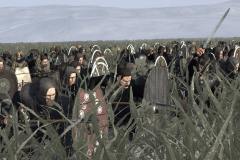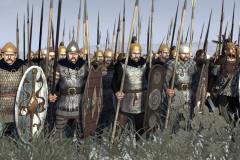The Caledones
One theory states that the name Caledones comes from the Proto-Celtic roots kal- (“hard”) and φēdo- (“foot”), alluding to steadfastness and endurance. Whether true or not, the name seems fitting for the remote Celtic tribe of farmers and hillfort builders at the cold, harsh far northern end of the known world who famously resisted several Roman invasion attempts. Eventually, this prompted the construction of great walls to contain instead of conquer the northern tribes. The Antonine Wall and Hadrian’s Wall stretched from coast to coast across narrow necks of northern Britannia and were manned by Roman garrisons, but they failed to stop the northern tribes from retaking territory several times, likely augmented by tribes from southern parts of Britannia fleeing Roman conquest. Cassius Dio for instance records that the Caledonians inflicted 50,000 Roman casualties due to attrition and unconventional tactics such as guerrilla warfare against a military expedition personally led by emperor Septimus Severus. After emperor Severus died to illness in Eboracum a few years later, the Romans were pushed back south of Hadrian’s Wall and no further Roman attempts at conquering Caledonia were ever made.
Sources such as Tacitus and Jordanes describes Caledonians as large, athletic, pale and red haired. The former author speculates that they were related to Germans and while there’s no evidence of that, some aesthetic inspiration has been from the similarly remote, rugged and inhospitable Germania. These visuals emphasize the otherness of Caledonians compared to other Celts and indeed, fellow Britons. For instance, unlike most Celtic nobles who went clean-shaven at the time, the Caledones sport full beards and rely on heavy pelts and leather from their agriculturally based economy and simpler to produce scale, rather than mail armors to a higher degree than other Celts.
The Caledones are designed to be a slow but strong defensive faction, featuring excellent spear units using Defensive Formation or Shieldwall, complemented by decent melee infantry and archers, but weak cavalry due to the difficulty to raise horses in such harsh lands.








